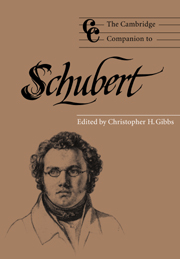Book contents
- Frontmatter
- Introduction: the elusive schubert
- Part I Contexts: musical, political, and cultural
- 1 Realism transformed: Franz Schubert and Vienna
- 2 “Poor Schubert”: images and legends of the composer
- 3 “The Passion for friendship”: music, cultivation, and identity in Schubert's circle
- 4 Schubert's inflections of Classical form
- 5 Schubert and his poets: issues and conundrums
- Part II Schuberts music: style and genre
- Part III Reception
- Notes
- Index
2 - “Poor Schubert”: images and legends of the composer
from Part I - Contexts: musical, political, and cultural
Published online by Cambridge University Press: 28 September 2011
- Frontmatter
- Introduction: the elusive schubert
- Part I Contexts: musical, political, and cultural
- 1 Realism transformed: Franz Schubert and Vienna
- 2 “Poor Schubert”: images and legends of the composer
- 3 “The Passion for friendship”: music, cultivation, and identity in Schubert's circle
- 4 Schubert's inflections of Classical form
- 5 Schubert and his poets: issues and conundrums
- Part II Schuberts music: style and genre
- Part III Reception
- Notes
- Index
Summary
“Poor Schubert.” Ever since his death on November 19, 1828, this expression appears over and over again in the writings of Schubert's friends, critics, and biographers. One reason, of course, is that he died so young, at the age of thirty-one. More prosaically, the adjective refers to the composer's precarious financial state throughout his life, although he was far from the destitute artist later sentimentalized in novels, operettas, and movies. The tag also conveys the sense that Schubert was neglected, that his gifts went largely unrecognized.
How and why did these recurring images of Schubert come about? Their outlines are remarkably consistent, from initial portrayals found in his friends’ reminiscences, to the first entries in German encyclopedias of the 1830s, to accounts in even the Encyclopaedia Britannica at the turn of the century and in college textbooks today.
One can easily pick out a few more brush strokes in the established portrait: Schubert is viewed as a natural and naive genius who wrote incomparable songs – the Liederfürst (“Prince of Songs”). And then there are his festive friends in the background. Even if the public at large ignored him, at least he enjoyed the loyal support of his circle. Always the best man, never the groom, Schubert is seen as unlucky in love. Early death meant that his artistic mission was left unfinished. Even with so many miserable circumstances, Schubert's music laughs through its tears, and the maudlin conflation of his life and works in myriad biographies and fictional treatments makes readers past and present weep. Poor Schubert.
- Type
- Chapter
- Information
- The Cambridge Companion to Schubert , pp. 36 - 55Publisher: Cambridge University PressPrint publication year: 1997
- 4
- Cited by



